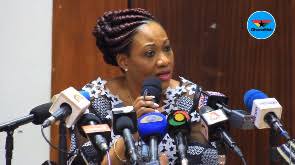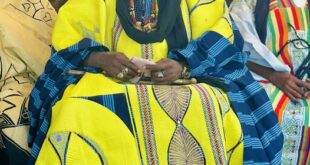
A Vice-President of Policy Think Tank, Imani Center for Policy & Education, has delivered the biggest blow yet to the ongoing discussion on the prudence in spending GHC400 million to compile a new voters’ register by the Electoral Commission (EC) led by Jean Mensah, by exposing a selfish agenda of one of those pushing the deal in the media.
Selorm Brattier, cites insider dealings at the Commission, revealing details on one Dr. Yaw Ofori-Adjei, who holds himself as an IT Consultant has his company; Fairgreen Limited, providing technical support and maintenance in place of STL and been paid significant amounts of money to step in, when the EC threw out STL.
The Deputy Imani boss, insisted that Dr. Ofori-Adjei, “a co-owner of Fairgreen Limited, an Accra based commercial equipment vendor, who has already benefitted from EC contracts as a result of the removal of the EC’s previous consultants, STL, therefore, the compilation of the GHC400 million is in his interest”.
Independence check by The Herald, has revealed Dr. Ofori-Adjei, who last week appeared in the media to justify the procurement of the new voters’ register in an election year, to be a hardcore sympathizer of the governing New Patriotic Party (NPP) has his company near Accra-based Joy FM in Kokomlemle.
The Herald’s visit to the website of Fairgreen, showed that while, Gifty Petra Boahene, is Chief Executive Officer and co-owner of Fairgreen Limited, Dr. Yaw Ofori-Adjei is listed as the Chief Technical Officer and Co-owner. He has been with the company since its inception, the website (www.fairgreenlimited.com)said.
Last week, Dr. Ofori-Adjei, attempted to demolish arguments by political parties and civil society organizations against the new register, insisting the current register which won the NPP the 2016 election and had also been used in the referendum on the creation of the new regions, as well as the district assembly elections, must be thrown away for a new one, which he can build in record time for the 2020 Presidential and Parliamentary elections.
On Citi FM, Dr. Ofori-Adjei, shocked many listeners when he cited war-torn Somalia as the country in which the new system he will be deploying was first used and attained a good result. He rubbished the likes of IMANI and others, for questioning the need for a register.
He was also not for the use of a data center built by the state by National Information Technology Agency (NITA) a public service institution established by Act 771 to be responsible for Ghana’s IT policies, including identifying, promoting and developing innovative technologies, and insisted that the EC was going to spending over US$6 million data center on the EC
Most officials of EC, had mentioned that a new register, would be done, but in an interesting twist, Dr. Ofori-Adjei, who revealed he was employed by the EC in 2019, claimed the EC will not be compiling a new register, but only seek to capture the fingerprints and also use a facial recognition device to get the faces of all registered voters in the system.
In an article released over the weekend, Mr. Branttier wrote “In the last week and half, we have all been subjected to the lecturing of “consultants” and “experts” leading the charge for the EC’s wasteful push to toss millions of dollars of barely used laptops and handheld devices in order to pave the way to spend $150 million (contingency inclusive) on a brand new system. One particular gentleman, Dr. Yaw Ofori-Adjei has been vocal in pushing the agenda to throw away all the equipment and buy new ones”.
He charged “We need to get one thing straight: everything the EC’s so-called IT experts say must be discounted *completely and without reservation* because they are not unbiased experts proferring objective technical advice solely in the interest of Ghana and the EC”, adding “Dr. Ofori-Adjei is a co-owner of Fairgreen Limited, an Accra based commercial equipment vendor, who has already benefitted from EC contracts as a result of the removal of the EC’s previous consultants, STL”.
The Deputy IMANI boss revealed that “Fairgreen had sent proposals to the EC to provide technical support and maintenance in place of STL and been paid significant amounts of money to step in when the EC threw out STL. No one is a champion of STL. But STL was merely a contractor. Upon removal of STL, the EC had every opportunity to work directly with the equipment and software makers, especially HSB and Genkey, to obtain all the requisite technical support and system replenishments. This would have made Dr. Ofori-Adjei redundant however and threaten the considerable amounts of money his company stood to gain from technical services and support contracts to the EC, especially ahead of the June 2019 electoral exercises”.
According to him, “Dr. Ofori-Adjei and Fairgreen’s continued push for a complete replacement (note, not even overhaul) of the existing system can easily thus be seen as entirely self-serving and motivated by commercial interest. Should the continuous upgrades model be used and the middlemen, including STL, be removed, in favour of dealing directly with the existing system’s developers Fairgreen’s self-serving advice which is going to see Ghana pay almost twice what country’s like Zimbabwe are paying for the same systems we are procuring would be useless in such a context”, adding “Dr. Ofori-Adjei’s zeal for a new system ought thus to be interpreted in this light”.
In the opinion of IMANI “It is in their interest to undermine the existing system so they can be relevant in the procurement of millions of dollars’ worth of new equipment and continue to justify their juicy fees.
Mr Branttier insisted “Let us not be side-tracked by self-serving vendors. Let’s focus on the essentials, and they are:
The biometric voter system we have in place has 7 main components, each with a different lifecycle and requiring a different type, schedule and scale of periodic maintenance:
1. The databases with biometric data.
2. The core software that checks and authenticate the biometric data. (ABIS).
3. The laptops, cameras and scanners used to collect the biometric data. Aka BVRs.
4. The handheld devices that authenticate voters during voting and exhibition. Aka BVDs.
5. The administrative software that manages all of this. They sit in the EC’s various offices. Aka VMS.
6. The data center in which the data and software sit. I.e. the “server farm”.
7. The communications and transmissions infrastructure that the EC uses to move data around. Especially the ground satellites (VSATs)”.
In his view, “to consider uprooting this whole system at once and replace in one go is the nearest thing to “madness” many of us have seen in the long track record of wasteful conduct in the public sector. The best way to think of this system is to think of a bank’s branchless banking platform. Different companies make different parts and you will always be replacing different parts at a different pace. Rain can knock down one satellite. Someone can spill tea on a laptop. A BVD can go missing etc. It is “madness” to argue that such a complex system can be managed in any other way apart from continuous upgrading and periodic overhauls”.
He revealed that “the system as a whole was audited in 2016 and equipment that was not at peak performance replaced. Whenever we add new districts we implement a fresh VMS and buy satellites etc. It is these improvements based on a superior understanding as our capacity to manage the system matured that made the 2016 biometric elections so much more superior to the 2012 elections, where biometric system failures led to, for the first and only time, premature termination of the vote and postponement to a new day”.
According to him , “We have spent over $40 million since 2016 based on the system audit to get the existing system into top shape and the quality of the elections we have had can testify to that. All the CODEO and EU reports tell us that the 2016 elections and biometric operations were smoother than the 2012 version and that the 2019 district level elections and biometric operations were smoother than the 2016 version. In many other countries, this same pattern of brand new biometric installations facing challenges that only get fully resolved with time and maturity has been consistent. The recent situation in Afghanistan where the vendor, Dermalog, had to be flown in last minute to fix major glitches and announcement of results took more than 6 weeks is a very cautious tale for Ghanaians”.
The boss argued that “we have comparable biometric systems in Ghana that have also relied on infrastructure built over a period of time undergoing periodic upgrades to maintain peak performance. The biometric passport system is an example. It dates from 2010. At this point a person can have a new passport issued without having their biometrics taken all over again simply because new vendors have been building on top of the existing system, upgrading and overhauling different parts of it at different times”, adding “only a vendor with their own interest to serve will counsel throwing away $60 million worth of systems (accounting for depreciation) to start from scratch. Systems that are used so infrequently that we still have thousands of BVDs that have been used only once, and in some cases never at all”.
To him, “all the savings numbers the EC has been given are unreliable because they come from self-interested vendors. We have checked what other countries have been paying for similar systems and found that all the numbers given by the EC are heavily inflated. If the EC does a proper competitive tender to just replace the components that need replacing they will end up spending just $15 million this year to refresh the system. And not the nearly $150m it will cost them to replace all the physical infrastructure and register all voters all over again”.
Mr Brattier concluded saying “Let us not forget that it is the same EC IT folks that have been responsible for the mess they claim the existing system is in that are now being positioned to procure and oversee a totally new system, including legal agreements and calibration between now and April 2020. If they have bungled the management and maintenance of the existing system so badly, why do we have confidence in them to use just 3 months to replace it and do a better job on a completely different platform?
Meanwhile, additional information obtained from the Fairgreen Limited website www.fairgreenlimited.com by The Herald described it as “a leading information and communications technology company that delivers world-class infrastructure solutions tailored to each client’s unique needs”.
It said it was “incorporated in Ghana in 1998, Fairgreen is a major player in hardware infrastructure solutions and in the automation of business processes for medium-sized to large institutions both in Ghana and in other parts of the world”.
“We design, install and provide support for data centre. We offer data centre services; consulting in end-user and/or client desktop deployment; consulting in server solutions; storage solutions; application services; power and cooling systems; as well as networking services”.
Source: theheraldghana.com
 Home Of Ghana News Ghana News, Entertainment And More
Home Of Ghana News Ghana News, Entertainment And More





